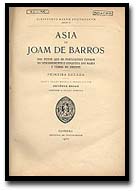


|
BARROS,
João de. Asia de Joam de Barros: dos
feitos que os portugueses fizeram no
descobrimento e conquista dos mares e terras do
Oriente. Primeira Decada. Coimbra: Imprensa da
Universidade, 1932.
Born into an educated family, João de Barros
(1496-1570) was raised in the court school for the sons of nobles. He occupied several
administrative positions in the Portuguese State, such as treasurer of the Casa da Mina
and head treasurer of the Casa de Ceuta, and later received a hereditary captaincy
in Maranhão in the northern part of Portugal's American colony. He gained fame for his literary
activity, which began with a novel of chivalry offered to the future Kin Dom João III and
edited in 1522, when bool printing was rare in Portugal.
The author of doctrinaire and pedagogic books,
he wrote a Gramática da Língua
Portuguesa (1539), for Indians and Africans, accompanied by a Diálogo em
louvor da nossa linguagem. Inspired by the idea of extolling the merits of the
Portuguese discoveries, he planned a great historical-geographical sybthesis divided into three
parts: the Conquest or narrative of the discovery and occupation of the four
continents, "Europe", "Africa", "Asia" and
"Santa Cruz"; Geography and Trade. However, only three
"Décadas" da Ásia were published during his lifetime,
between 1552 and 1563. Década IV was published posthumously, while
the manuscript of the Geografia Universal
was lost and that of Comércio remained unfinished.
In the opinion of Antonio Jose Saraiva, though exact with regard to the facts narrated,
by dint of system and even doctrine, João de Barros omits all that might
tarnish the monarchs and grand personalities, as well as the decorum of the Portuguese
nation. At the same time he strives to show Portugal's rights to the monopoly of the
sea routes to the Orient, the occupied territories, and trade. His understanding is that
the wars waged in the Orient were a consequence of the Crusades against the Moslem infidel
that began with the Reconquest of the Iberian peninsula. He nonetheless reveals a sensitive
awareness of the relative nature of European, Christian civilization in his appreciative
description of the Chinese civilization. |



